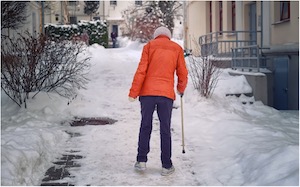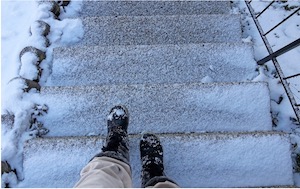Rochester, New York, Personal Injury Lawyers: What Is The Open And Obvious Condition Defense?
Jed Dietrich, Esq., is Recognized as A Best Lawyer of America, Who Has Dedicated His Career to Combating Negligence and Injustice. If You Have Been Injured or Lost a Loved One After a Serious Rochester Accident, You Could Be Eligible for Compensation.
 New York property owners and landlords have a legal duty to ensure their premises are safe from unreasonable risks and hazards. If you, or a loved one, have been seriously injured in a Rochester-area premises liability accident, you could be entitled to significant compensation through an insurance claim or personal injury lawsuit. However, businesses and their insurers are for-profit enterprises. Even if you have a seemingly open-and-shut case, staging a full-scale legal recovery could pose unexpected challenges. When a negligent property owner is accused of creating or failing to amend an unsafe condition, they could simply allege that the danger was so obvious that "you should have known better."
New York property owners and landlords have a legal duty to ensure their premises are safe from unreasonable risks and hazards. If you, or a loved one, have been seriously injured in a Rochester-area premises liability accident, you could be entitled to significant compensation through an insurance claim or personal injury lawsuit. However, businesses and their insurers are for-profit enterprises. Even if you have a seemingly open-and-shut case, staging a full-scale legal recovery could pose unexpected challenges. When a negligent property owner is accused of creating or failing to amend an unsafe condition, they could simply allege that the danger was so obvious that "you should have known better."
Sometimes called the "open and obvious condition" defense, this argument suggests that—just as property owners have a legal duty to ensure their premises are safe—consumers, guests, and the general public have an obligation to avoid evident obstacles. While the "open and obvious" defense does not necessarily absolve a negligent business of financial liability, it could threaten the overall value of an insurance settlement or court-ordered award.
If you have been hurt in a Rochester slip-and-fall accident, road obstacle collision, or weather-related car crash that was not your fault, you probably already know that a serious injury can be as financially devastating as it is physically painful. The Dietrich Law Firm P.C. believes that nobody should ever have to pay out-of-pocket to correct another person's poor decision, which is why our experienced team of attorneys is committed to providing the highest level of personal injury service in the region. Since our founding in 2005, we have helped our clients across Western New York obtain more than $250 Million in damages—money they could use to pay off their medical bills, seek superior health care, and begin the difficult task of moving past a life-changing accident. We could help you, too. Please send the Dietrich Law Firm P.C. a message online or call us at 585-939-3939 to schedule your free, no-obligation consultation as soon as possible.
 Property owners have a legal duty to protect guests, consumers, and the general public from danger. Under most circumstances, a property owner could be held financially responsible for an accident if they:
Property owners have a legal duty to protect guests, consumers, and the general public from danger. Under most circumstances, a property owner could be held financially responsible for an accident if they:
- Know about, or should know about, a dangerous condition on their premises that presents a significant or unacceptable hazard;
- Should expect that an individual would not discover the danger or take the requisite steps to protect themselves from it; and
- Fails to either amend the condition or provide a warning of its existence.
However, simply being hurt on another person's property does not entitle an accident victim to recompense, with the "open and obvious condition" defense presenting a critical exception to this definition of negligence. Under the "open and obvious condition" rule, a plaintiff could be denied compensation if they:
- Encounter a condition that a reasonable person would recognize as an unmarked but otherwise obvious potential hazard, such as an ice-covered sidewalk;
- Have the time or means to avoid the condition but choose not to; and
- Are subsequently injured by the condition.
While the "open and obvious" doctrine may seem an unfair way to limit deserved plaintiffs' legal means for recourse, it protects honest property owners from frivolous and bad-faith litigation.
After all: if legislators did not consider the possibility that some people might file lawsuits in bad faith, it would be incredibly easy for dishonest people to feign or exaggerate injury for personal gain. Consequently, New York courts allow property owners, businesses, and landlords to limit liability if a personal injury plaintiff's recklessness caused or contributed to an accident. The "open and obvious condition" defense is thus commonly raised in premises liability cases if the property owner, or their insurer, has reason to believe that the accident victim could have avoided or minimized their injuries by taking common-sense precautions.
Of course, a property owner's contention that a hazard was obvious does not mean that the condition was visible or otherwise evident to an unsuspecting passerby. The Dietrich Law Firm P.C. has years of experience standing up for the victims of negligence, both in insurance negotiations and in court. We understand that the landlord, business, or construction company's version of events only constitutes one side of the story. Your perspective matters, and your story deserves to be told. By taking action, you could not only secure the compensation you deserve but set a standard for accountability that helps keep others safe from negligence. Please call us at 585-939-3939 today to schedule your free consultation.
HAVE YOU BEEN INJURED OR LOST A LOVED ONE IN A ROCHESTER OR MONROE COUNTY ACCIDENT?
CALL JED DIETRICH, ESQ., AND HIS TEAM OF HIGHLY QUALIFIED ROCHESTER, NEW YORK, PERSONAL INJURY ATTORNEYS AT 585-939-3939 NOW TO OBTAIN THE HELP THAT YOU NEED!
The "open and obvious" defense is so potent that New York property owners have, in the past, successfully used it to argue they should not be held liable for injuries incurred by unamended and unindicated hazards.
However, a property owner cannot cite an "open and obvious" condition to limit liability if their own negligence caused or contributed to the condition. Even if an obstacle, defect, or product is clearly and inherently dangerous, property owners still have a "duty of care" to guests. In other words, property owners must still take some measures to amend conditions that could foreseeably cause serious injury.
When the Dietrich Law Firm P.C. accepts a new case, we investigate and evaluate the circumstances of an accident to assess liability. If a property owner tries to devalue your claim by suggesting that you ignored an open and obvious condition, we could argue:
- The Hazard Was Not Foreseeable or Reasonable: An open and obvious condition is not the same as an open and obvious danger. If the hazardous condition existed in a space or place where a reasonable person would next expect to encounter an increased risk of injuries—such as a bathroom stall or a hospital waiting room—the property owner could still be held liable for any resulting injuries.
- Negligence Per Se: A personal injury plaintiff could still secure damages even if they have been injured by an open and obvious condition, provided that the condition was caused by the property owner's failure to follow the law. For example, a staircase without a handrail could be considered an obvious hazard. However, New York's Property Code mandates that publicly accessible staircases all have handrails. Consequently, a plaintiff who loses their balance and falls off the stairs could still claim damages for their injuries because the landlord broke violated the law by failing to install or replace the damaged handrail.
- The Distraction Exception: Property owners must account for the possibility that customers and guests may encounter environmental distractions that could prevent them from noticing an otherwise obvious hazard. For example, an individual could trip and fall on an obviously broken or under-repair sidewalk if they are passing through a construction zone and fear they could be stricken by overhead debris.
- Comparative Negligence: People make mistakes. Even if your own oversight contributed to your accident, it does not mean that the property owner has no liability. Since New York follows the "comparative negligence" doctrine, the defendant could still be liable for any injury-related damages. If you are found partially at fault for the accident, your settlement or award will be reduced in proportion to your level of fault.
Do not lose your opportunity to get justice after a serious Rochester accident. Please send us a message online or call us at 585-939-3939 to discuss your strategies.
Call the Dietrich Law Firm P.C. immediately at 585-939-3939 so that our aggressive, tenacious, and hardworking personal injury lawyers can fight to obtain the best result for your personal injury claim in Rochester, New York. We are available 24 hours a day, 7 days a week, and there is never a fee until we WIN for you!
 Dietrich Law Firm P.C. Home
Dietrich Law Firm P.C. Home










